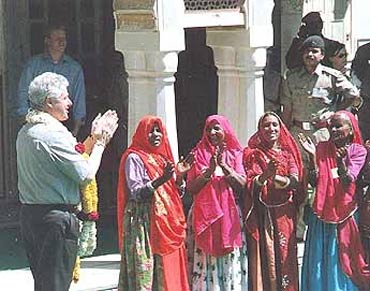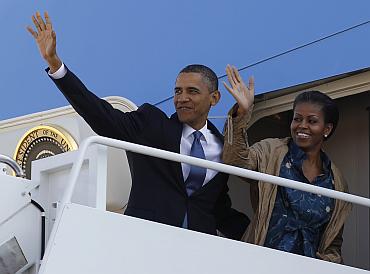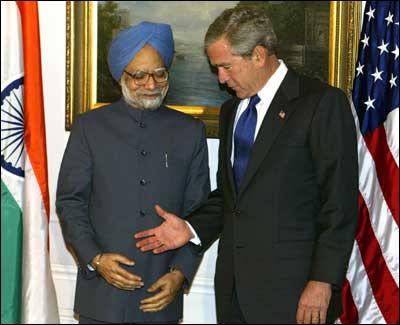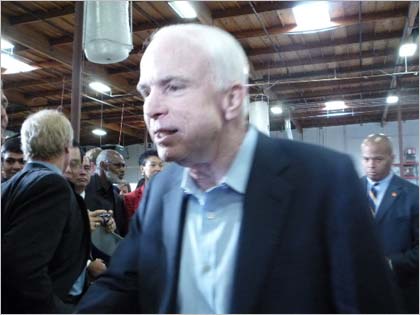Photographs: Sondeep Shankar/Saab Press Aziz Haniffa in Washington, DC
McCain, who is the ranking minority member of the powerful Senate Armed Services Committee and one of the most influential lawmakers when it comes to foreign policy, said "the emergence of a strategic partnership with India has been one of the most consequential bipartisan successes of recent US foreign policy."
In a major foreign policy address at the Carnegie Endowment for International Peace in Washington, DC, exactly at the time President Obama was boarding Air Force One at Andrews air force base to head to India, McCain acknowledged that the transformation of US-India relations had begun with "President Bill Clinton's historic visit to India in 2000."
"It grew exponentially with President George W Bush's strategic decision to invest America's global influence in the propulsion of India's rise to power -- a decision that reached its fullest expression in the groundbreaking civilian nuclear agreement," he said.
"Our new partnership with India has been consistently affirmed, sustained, and broadened by overwhelming bipartisan majorities in Congress," the Republican Senator said, and predicted, "with the President set to arrive in Mumbai on Saturday, the potential to expand our partnership is immense."
'Our ties with India must be above politics'
Image: Barack and Michelle Obama board Air Force OnePhotographs: Jason Reed/Reuters
McCain noted that the US-mid-term Congressional election on Tuesday, where Obama's Democratic Party received a drubbing and the Republicans stormed back to regain the House of Representatives, "was a reminder, as if we needed one, that Americans will always have plenty to fight about."
"But I am pleased that the US-India relationship hasn't been one of them," he asserted, and added, "We need to keep it that way. We need to continue to elevate our partnership with India above the political fray, because its potential benefits are just too important -- to America, to India, and to the world."
And if any justification was needed as to why this partnership was so important, McCain spelled it out, pointing out that "India will soon become the world's most populous nation," and that the "young and increasingly skilled workforce," in that country "will soon lead India to become the world's fastest growing economy and ultimately one of the biggest."
'We seek not to limit India's rise'
Image: Prime Minister Manmohan Singh with then US President George W Bush in Washington, DCObviously taking a swipe at China's galloping economic growth, McCain said "at a time when many have become enamored with an authoritarian model of State capitalism and its ability to generate wealth and power, there can be no greater demonstration that political pluralism, free markets, and the rule of law are a morally and materially superior way to organise diverse societies than the success of democratic India."
"Who can believe in 'Asian values' or doubt the universality of democratic capitalism in a world where India exists?" he asked, and argued that "contrary to the old dictates of realpolitik, we seek not to limit or diminish India's rise, but to bolster and catalyse it -- economically, geopolitically, and yes, militarily. In short, the United States has a compelling stake in the success of India."
'The virtue of the US-India relationship is its breadth'
Image: Senator John McCainPhotographs: Rediff.com
"We must also resist the temptation to lose our strategic focus by failing to set priorities," he said, and declared, "the virtue of the US-India relationship is its breadth. It spans issues of trade and development, agriculture and education, energy and health and many other issues."
However, McCain said, "The real leaders on this front are our people, who have been and will remain far out ahead of our governments. The role of our public sphere, then, is to remove every obstacle that stands between our continued collaboration of our dynamic societies and private sectors. With proper guidance and political will, this is largely a technical matter, not a strategic one."
"If the United States and India are to forge a truly strategic partnership," he added, "our senior leaders in government must prioritise two areas of cooperation above all: Security and values -- in short, the creation of geopolitical conditions that secure and expand the community of countries that value political and economic freedom."
"What this means in practice is that, while respecting one another's independence as equal and sovereign partners, India and the United States should increasingly align our policies and our instruments and national power to achieve three strategic goals,"McCain said.
First, he said, both countries had to "shape the development of South Asia as a region of sovereign, democratic states that contribute to one another's security and prosperity. Second, "to create a preponderance of power in the Asia-Pacific region that favours free societies, free markets, free trade, and free commons."
McCain said it was imperative that Washington and Delhi "strengthen a liberal international order and an open global economy that safeguard human dignity and foster peaceful development."





article